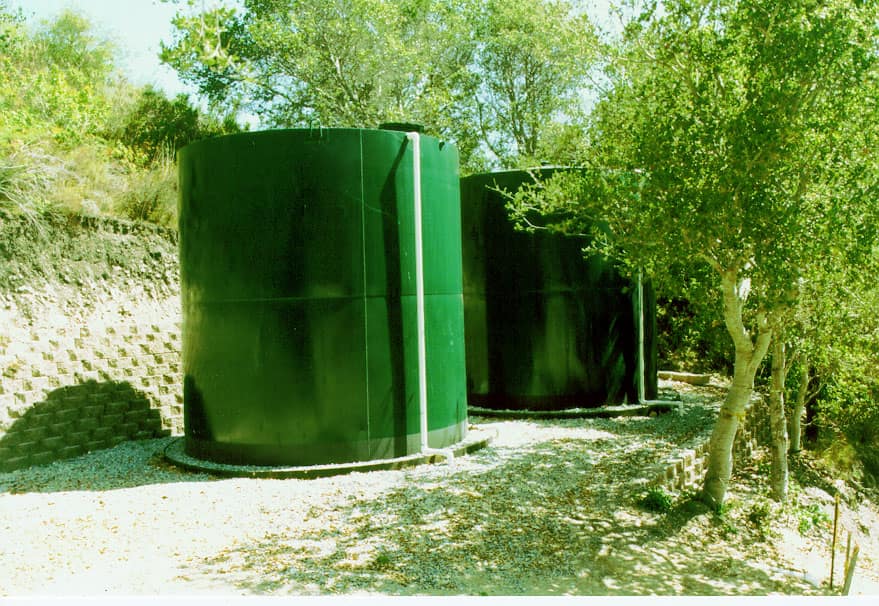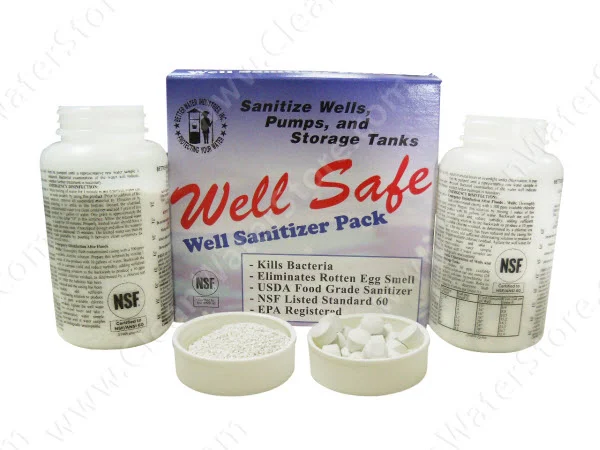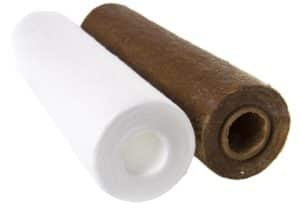How to Eliminate Odor from Well Water: Chlorination or Aeration
2 Easy Ways to Eliminate Well Water Odor
Foul water smells are a common problem in well water systems. They are generally caused by hydrogen sulfide (H2S) gas, which can get into water sources in several ways: via sewage systems, near coal and peat deposits, in oil fields, and most commonly from iron and sulfur bacteria.
These bacteria thrive on iron and sulfur and chemically convert sulfates to produce H2S gas, causing the odors commonly experienced in well water systems.
The two main methods used to treat strong sulfur odors are aeration and chemical injection with hydrogen peroxide or chlorine.

Self-contained sulfur filters use direct air injection to oxidize sulfur out of your water, then pass the water through a bed of filtration media specifically designed to remove odors from water.
These systems are automatically backwashing, meaning the media inside is cleaned every 1-2 nights. This prolongs the life of the media and provides the air used for oxidation.
The other option is to inject hydrogen peroxide or chlorine via a metering pump, providing extra strength for oxidizing strong odors and treating iron and manganese, which might also be fouling up your system. If the problem persists despite these treatments, homeowners may need to consider additional solutions, such as activated carbon filtration systems, or consult their local water authority.
This system will also disinfect your water of all common household bacterial contamination. The system works by feeding hydrogen peroxide or chlorine into a contact tank or inline mixer to ensure the disinfectant is thoroughly mixed and has enough contact time to kill any bacteria.
You could also install a carbon filter after the chlorinator to filter out the oxidized particulate matter and remove any lingering chlorine tastes. For a natural alternative to chemical drain cleaners, baking soda combined with vinegar and hot water can effectively disinfect pipes and remove bacteria buildup.
Introduction to Well Water Odors
Well water odors can be a significant concern for households that rely on private wells for their drinking water supply. Various factors, including bacterial growth, chemical contamination, and physical contamination, can cause unpleasant odors in well water. One of the most common and distinctive water smells is that of rotten eggs, caused by hydrogen sulfide gas.
One of the most common and distinctive odors associated with well water is the “rotten egg smell,” which is caused by the presence of hydrogen sulfide gas. The health impacts of exposure to hydrogen sulfide gas can be severe, including headaches, dizziness, and nausea. This odor can be unpleasant and a sign of potential health risks. Identifying the exact cause of the odor is crucial for determining the best treatment method.
In this section, we will explore the causes, effects, and treatment options for well water odors, with a focus on the rotten egg smell caused by hydrogen sulfide gas.
Causes of Well Water Odors: Hydrogen Sulfide Gas
Well water odors can be caused by various factors, including bacterial growth, chemical contamination, and physical contamination. Bacterial growth is a common cause of well water odors, particularly the rotten egg smell caused by hydrogen sulfide gas. This gas is produced by sulfate-reducing bacteria, which thrive in environments with low oxygen and high organic matter levels. Organic materials in water can react with chlorine, resulting in disinfection byproducts that contribute to odors.
Other causes of well water odors include iron bacteria, which can produce a slimy substance that clogs wells and plumbing systems. Issues with household plumbing can also lead to persistent odors, indicating the need for regular maintenance. Decaying organic matter can release unpleasant odors into the water supply.
Earthy odors are another common issue, often caused by bacterial activity in private well systems. Chemical contamination, such as the presence of chlorine or other disinfectants, can also contribute to well water odors. Physical contamination, such as the presence of sediment or debris, can also affect the taste and odor of well water.
Effects of Hydrogen Sulfide Gas
Hydrogen sulfide gas can have severe effects on the human body, particularly the nervous system. Prolonged exposure to high concentrations of hydrogen sulfide gas can cause headaches, dizziness, and nausea. In extreme cases, it can even lead to respiratory failure. The rotten egg smell caused by hydrogen sulfide gas can be a sign of a larger issue with the water supply, and it is essential to address the problem promptly to avoid any potential health risks. Homeowners can take steps to prevent bacterial growth, such as regular maintenance of their water heaters and plumbing system, to minimize the risk of hydrogen sulfide gas buildup.
Identifying the Source of the Odor
Identifying the source of the odor is crucial in determining the best course of action to eliminate the smell. The odor in both hot and cold water may indicate a problem with the water supply or the plumbing system. On the other hand, if the odor is only present in hot water, it could be a sign of a problem with the water heater.
Homeowners can perform a simple test by filling a glass with tap water and letting it sit for a few minutes to see if the odor persists. If the odor is still present, it may be necessary to contact a licensed plumber to inspect the plumbing system and identify the source of the problem. Regularly checking the water heater’s temperature and pressure relief valve can also help prevent bacterial growth and reduce the risk of odor issues.
Testing for Sulfate Reducing Bacteria
Testing for sulfate-reducing bacteria is essential in determining the cause of the rotten egg smell in drinking water. Several methods are available, including chlorination/peroxide injection and aeration methods. These methods can help identify the presence of sulfate-reducing bacteria, which can produce hydrogen sulfide gas and cause the rotten egg smell.
Treatment Options for Well Water Odors
Several treatment options are available for well water odors, depending on the cause and severity of the odor. One of the most common treatment methods is shock chlorination, which involves adding a high dose of chlorine to the well water to kill bacteria and other microorganisms. This method is effective against a wide range of bacteria, including sulfate-reducing bacteria that cause the rotten egg smell.
If the problem persists, it is advisable to contact your water provider for further assistance. Another treatment option is the use of activated carbon filters, which can remove impurities and odors from the water supply. Bacterial activity is a common cause of persistent odors; addressing it is crucial for maintaining water quality.
Reverse osmosis systems can also effectively remove impurities and odors from well water. In some cases, the installation of a new well or the repair of an existing well may be necessary to eliminate the source of the odor. For issues related to the public water supply, contacting your water provider can help ensure that the water remains safe for consumption.
Chlorination/Peroxide Injection Method
The chlorination/peroxide injection method involves injecting a chlorine bleach solution into the water supply to kill any bacteria present. This method is effective in eliminating sulfate-reducing bacteria and can help prevent the growth of new bacteria. However, following the manufacturer’s instructions and taking the necessary safety precautions when handling chlorine bleach is essential. Regular water heater and plumbing system maintenance, including shock chlorination, can also help prevent bacterial growth and reduce the risk of odor issues.
Aeration Method
The aeration method involves introducing oxygen into the water supply to prevent the growth of sulfate-reducing bacteria. This method is effective in eliminating the rotten egg smell and can be used in conjunction with other treatment devices, such as activated carbon filters.
Aeration can also help reduce the levels of other contaminants, such as iron bacteria, and improve the overall water quality. Regularly checking the water distribution system and plumbing fixtures can also help identify any potential issues and prevent the growth of bacteria. By addressing the root cause of the odor issue, homeowners can enjoy clean and fresh drinking water free from unpleasant odors and tastes.
Advantages and Disadvantages
The chlorination method offers several advantages. It is effective against many types of bacteria and is relatively low-cost.
However, it also has disadvantages. Chlorine can react with organic matter and form disinfection byproducts, which may be harmful to human health. Chlorination may not work against all bacteria and often requires repeated treatments to stay effective.
Improper water heater settings can also lead to high energy costs. It’s important to monitor and adjust the temperature as needed.
Overall, chlorination can be an effective way to treat well water odors. However, it should be used carefully and combined with other methods, like activated carbon filters or reverse osmosis systems. Maintaining an operable pressure relief valve on water heaters is also crucial for safety and efficiency.
If you have any further questions or comments, please email support@cleanwaterstore.com or message us on Facebook. We are here to help!













